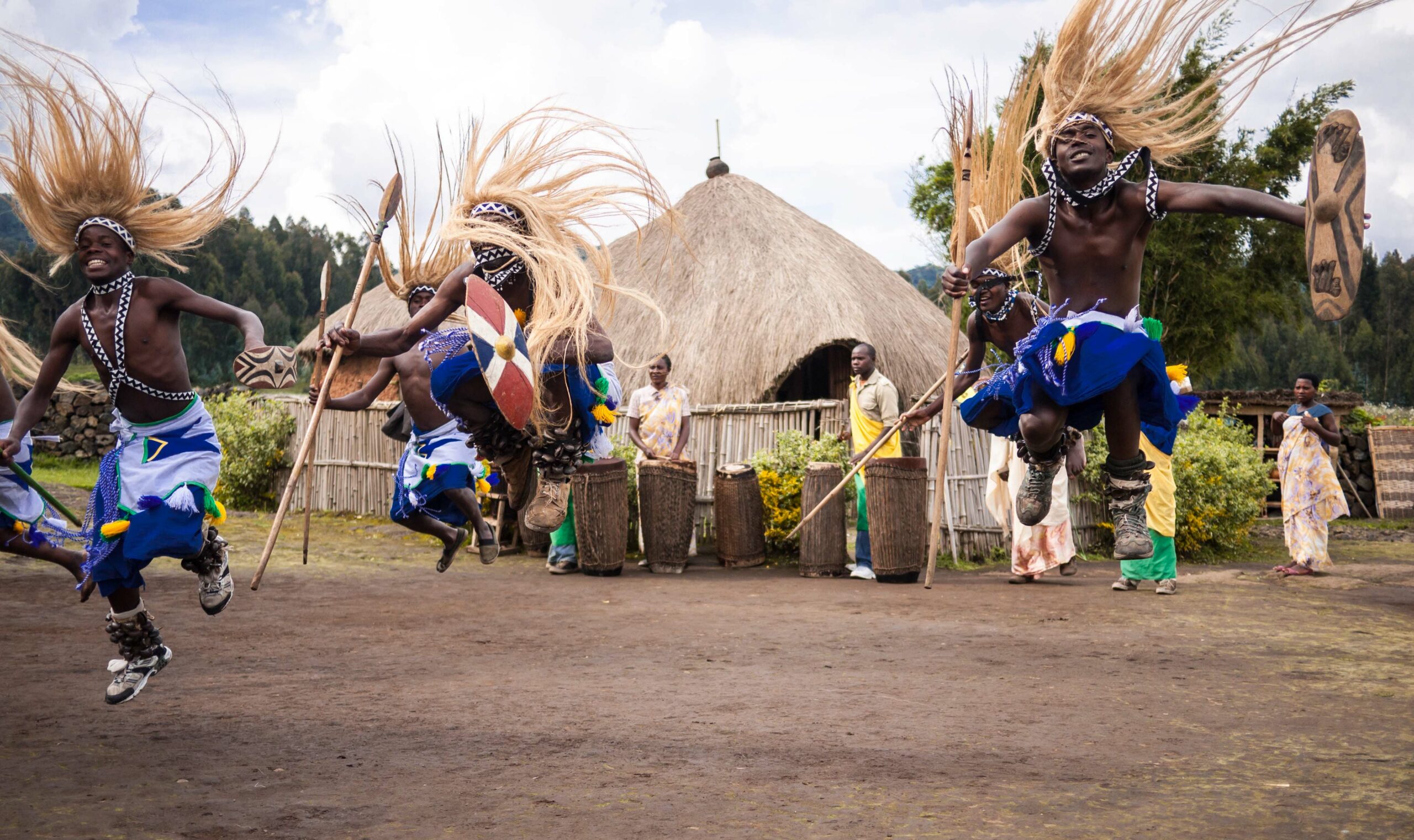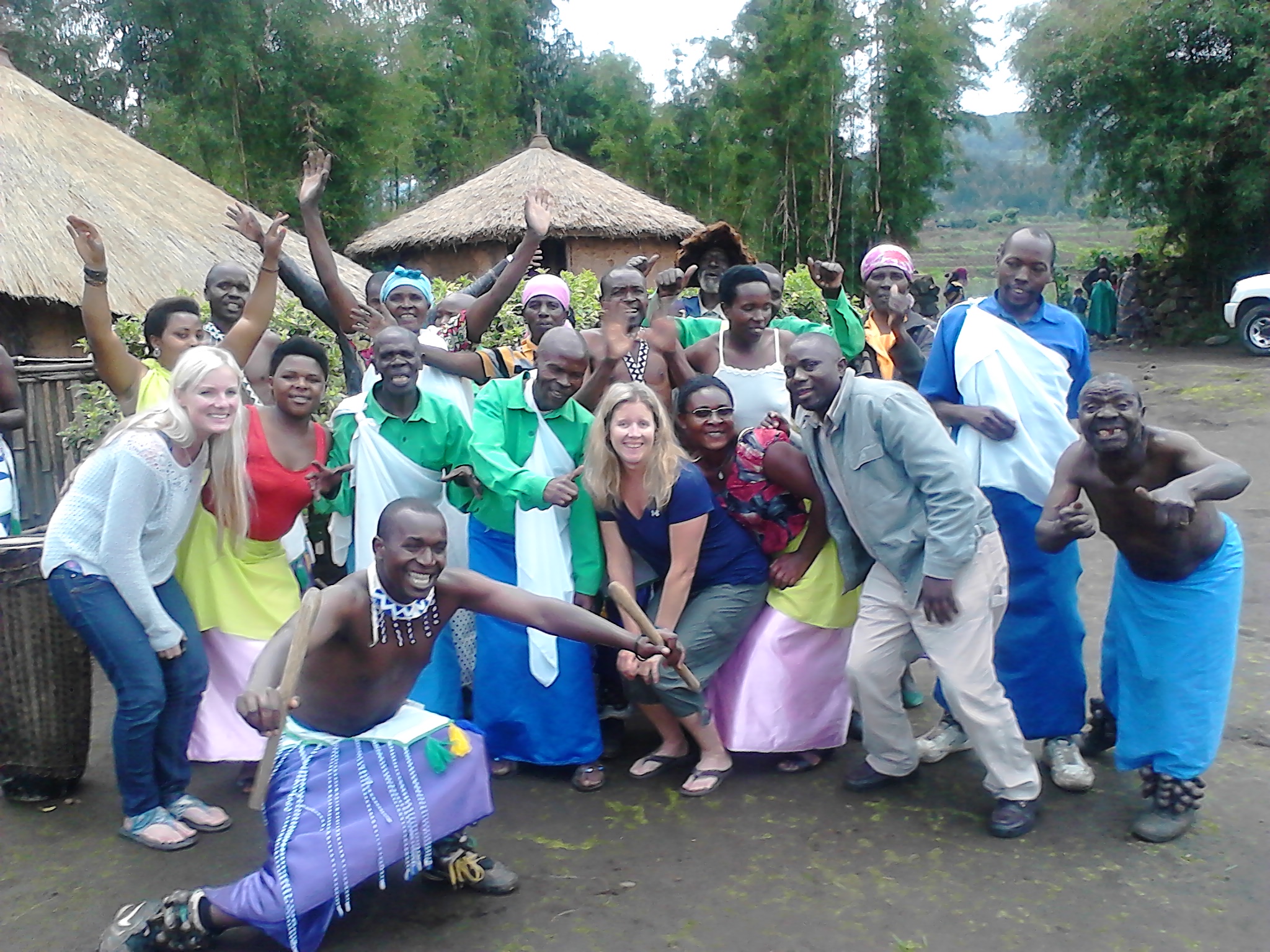Iby’Iwachu Cultural Village: A Gateway to Rwandan Heritage and Tradition
Nestled near the Volcanoes National Park in Rwanda, Iby’Iwachu Cultural Village offers a unique and immersive experience into the traditional lifestyle of the Rwandan people. Founded in 2007, this cultural village was created with the aim of preserving and showcasing Rwandan heritage while providing a meaningful source of income for the local community. The village serves as a vibrant representation of Rwandan culture, offering visitors a chance to engage with local traditions, crafts, and daily life. With its authentic cultural experiences and close proximity to Rwanda’s renowned gorilla trekking destinations, Iby’Iwachu is an integral part of the broader safari experience in the region.
Traditional Rwandan Ceremonies: A Glimpse into Cultural Practices
Iby’Iwachu Cultural Village provides an in-depth look into traditional Rwandan ceremonies, offering visitors a chance to witness and participate in age-old rituals. One of the highlights is the Intore Dance, a traditional Rwandan dance characterized by energetic movements, vibrant costumes, and rhythmic drumming. This dance, historically performed by warriors, is a testament to Rwanda’s rich cultural heritage. Visitors can also observe traditional ceremonies such as the naming ceremonies and marriage rituals, which offer insights into the customs and values that shape Rwandan society. These ceremonies are not only visually captivating but also serve as an educational experience, allowing visitors to appreciate the depth and significance of Rwandan traditions.
Traditional Craftsmanship: Artisans at Work
The cultural village is home to skilled artisans who practice traditional Rwandan crafts, providing a hands-on experience for visitors interested in the art of craftsmanship. Visitors can watch as artisans create intricate beadwork, woven baskets, and traditional clothing using techniques passed down through generations. One of the most notable crafts is the making of imigongo, a unique form of Rwandan art characterized by geometric patterns and earthy colors. This traditional artwork, often used to decorate homes, is made from cow dung and natural pigments. By engaging with artisans and participating in craft-making workshops, visitors gain a deeper appreciation for the craftsmanship and creativity that define Rwandan cultural heritage.
Traditional Cuisine: A Taste of Rwandan Flavors
A visit to Iby’Iwachu Cultural Village is incomplete without sampling traditional Rwandan cuisine, which is an integral part of the cultural experience. The village offers a variety of local dishes, prepared using traditional methods and ingredients. Some of the highlights include ugali (a staple made from maize flour), brochettes (grilled meat skewers), and ibitoke (plantains). Traditional Rwandan meals are often enjoyed in a communal setting, reflecting the importance of social connections and shared meals in Rwandan culture. Visitors can also participate in cooking demonstrations, learning how to prepare traditional dishes and gaining insights into the culinary traditions of Rwanda. This gastronomic experience enhances the cultural immersion and provides a flavorful introduction to Rwandan cuisine.
Engaging with Local Communities: Sustainable Tourism and Community Benefits
Iby’Iwachu Cultural Village is committed to sustainable tourism practices that benefit both visitors and the local community. The village was established with the goal of providing economic opportunities for local residents while preserving and promoting Rwandan culture. Revenue generated from tourism supports community development projects, including education and healthcare initiatives. Visitors to the village have the opportunity to engage with local residents, learn about their way of life, and contribute to the community’s economic well-being. This model of sustainable tourism fosters a positive relationship between visitors and the local community, ensuring that tourism contributes to the preservation of cultural heritage and the improvement of local livelihoods.
Comparing Cultural Experiences with Other Iconic African Destinations
Maasai Village Visits, Kenya: A Cultural Encounter with the Maasai
In Kenya, cultural visits to Maasai villages offer a different but equally enriching cultural experience. The Maasai people are known for their distinctive customs, attire, and way of life, and village visits provide insights into their traditional practices and daily routines. Visitors can participate in traditional dances, learn about Maasai pastoralism, and engage with Maasai artisans. Similar to Iby’Iwachu, these cultural experiences are designed to promote understanding and appreciation of local traditions while providing economic benefits to the community. The Maasai village visits offer a contrast to Rwandan culture but share the common goal of cultural preservation and community engagement.
Zulu Village Tours, South Africa: Exploring Zulu Traditions
Zulu village tours in South Africa offer another unique cultural experience, showcasing the traditions and customs of the Zulu people. Visitors can observe traditional Zulu ceremonies, including dances and rituals, and learn about the significance of these practices in Zulu society. Craft workshops and culinary experiences are also part of the tour, providing a comprehensive introduction to Zulu culture. Like Iby’Iwachu, Zulu village tours emphasize cultural immersion and community involvement, offering visitors a chance to connect with local traditions and contribute to the preservation of cultural heritage.
Himba Village Visits, Namibia: Insights into Himba Culture
In Namibia, visits to Himba villages offer a fascinating glimpse into the nomadic lifestyle of the Himba people. Known for their distinctive attire and body adornments, the Himba people maintain traditional customs that have been preserved for centuries. Visitors can learn about Himba rituals, see traditional crafts being made, and participate in cultural activities. The Himba village visits, like those at Iby’Iwachu, aim to provide an authentic cultural experience while supporting local communities through tourism. The contrast in cultural practices highlights the diversity of African cultures and the value of immersive, respectful interactions.
San Bushmen Cultural Experiences, Botswana: A Journey into Ancient Traditions
Cultural experiences with the San Bushmen in Botswana offer a deep dive into one of Africa’s oldest indigenous cultures. Visitors can participate in traditional hunting and gathering activities, learn about San bushcraft skills, and hear stories about the San’s historical and cultural heritage. The San Bushmen’s way of life, characterized by a deep connection to the land and nature, provides a unique perspective on traditional African cultures. These experiences, like those at Iby’Iwachu, emphasize cultural preservation and community engagement, offering visitors a meaningful and educational encounter with indigenous traditions.
Conservation and Cultural Preservation: A Model for Sustainable Tourism
Iby’Iwachu Cultural Village represents a successful model of integrating cultural preservation with sustainable tourism. By providing visitors with authentic cultural experiences and actively involving the local community, the village contributes to the protection and promotion of Rwandan heritage. The emphasis on community benefits and environmental sustainability ensures that tourism supports both cultural preservation and local development. This approach aligns with broader conservation and cultural preservation efforts across Africa, where sustainable tourism practices play a crucial role in protecting natural and cultural resources while benefiting local communities.
Conclusion: A Cultural Treasure in Rwanda
Iby’Iwachu Cultural Village offers a rich and immersive experience that highlights the depth and diversity of Rwandan culture. From traditional ceremonies and craftsmanship to culinary delights and community engagement, the village provides visitors with a comprehensive understanding of Rwandan heritage. The cultural experiences at Iby’Iwachu complement the natural beauty and wildlife encounters of Rwanda, creating a well-rounded and meaningful travel experience. Comparisons with other iconic African cultural destinations highlight the unique features of Iby’Iwachu while showcasing the common goals of cultural preservation and community support. For travelers seeking an authentic and enriching cultural experience, Iby’Iwachu Cultural Village stands out as a vibrant gateway to Rwanda’s cultural heart.



